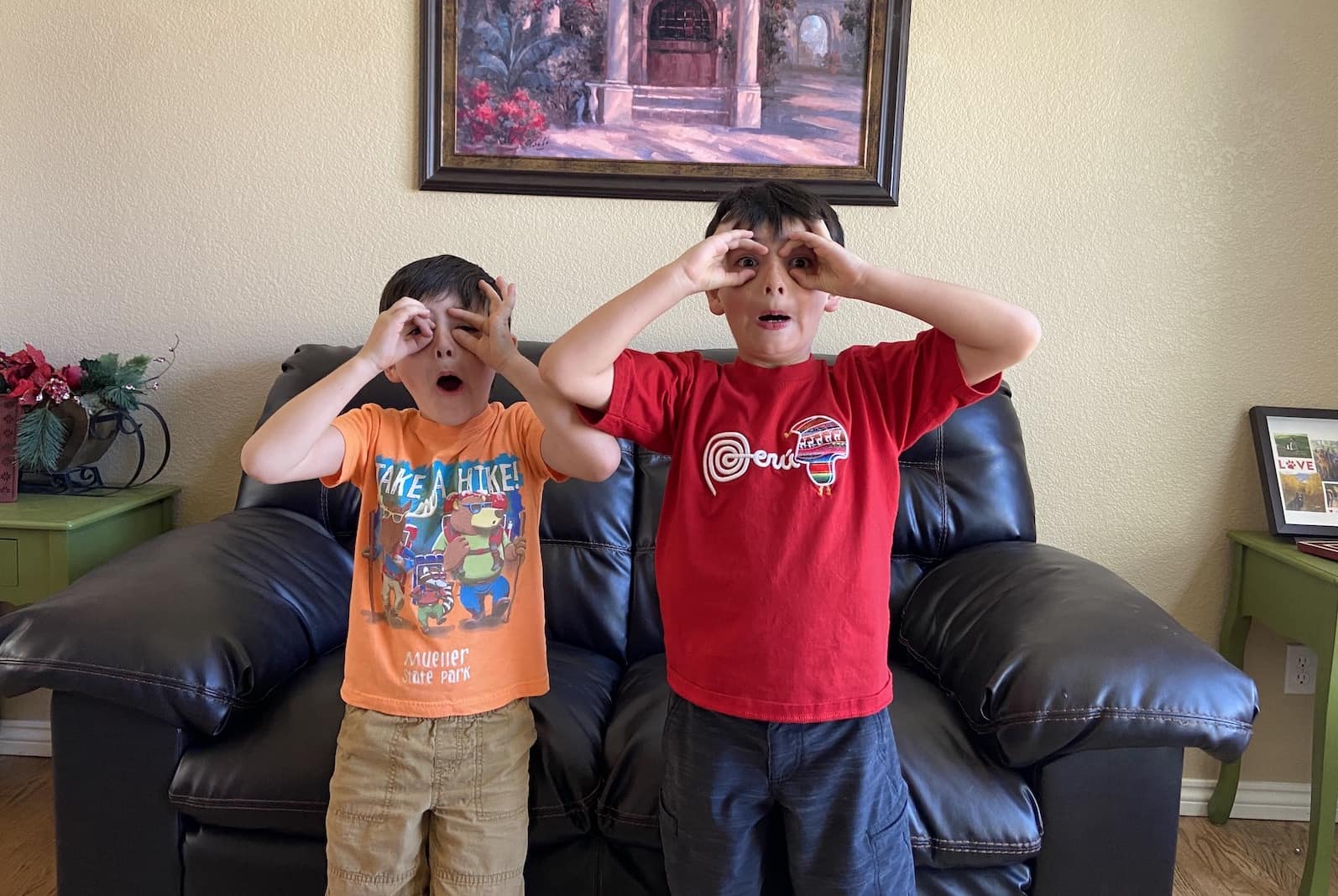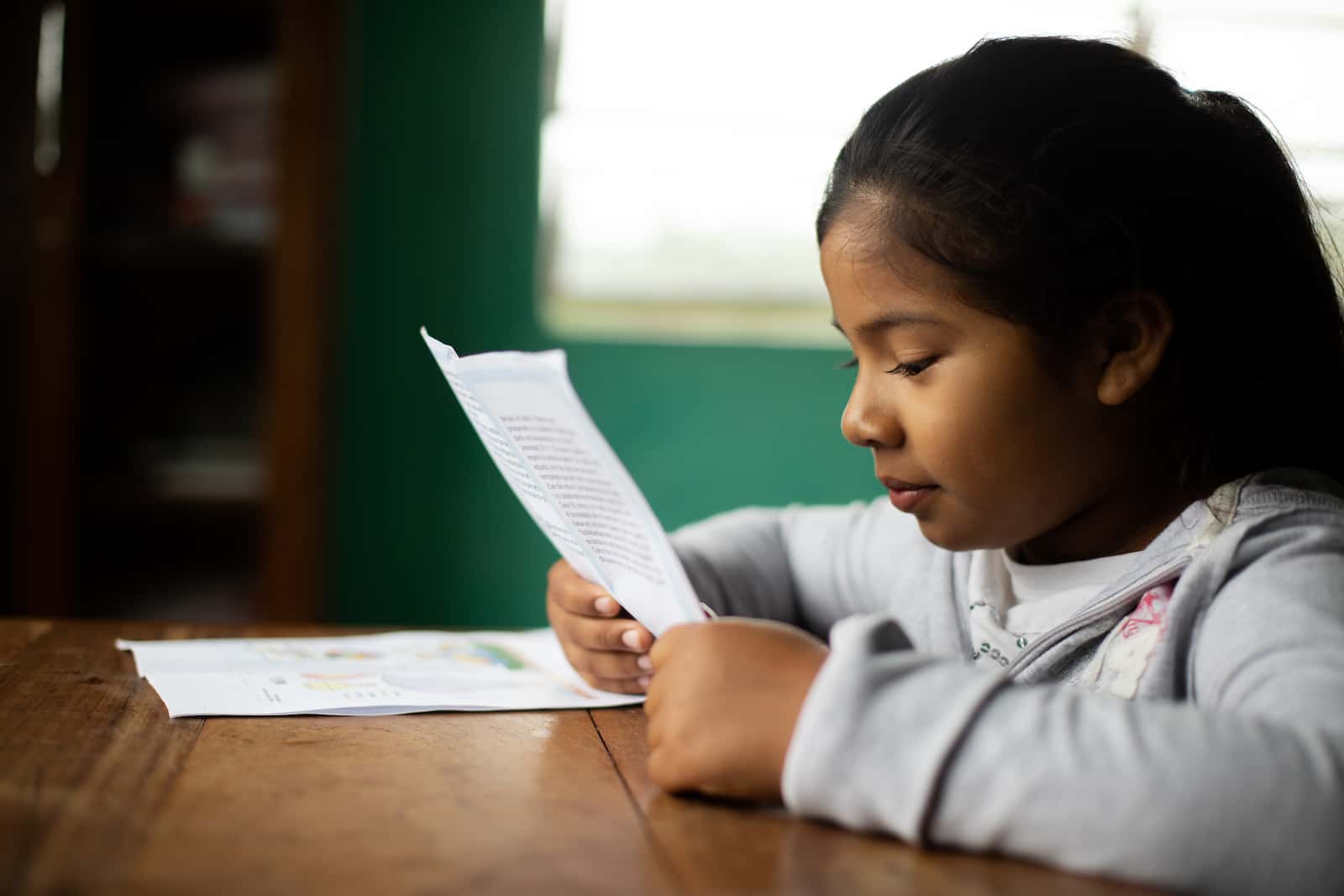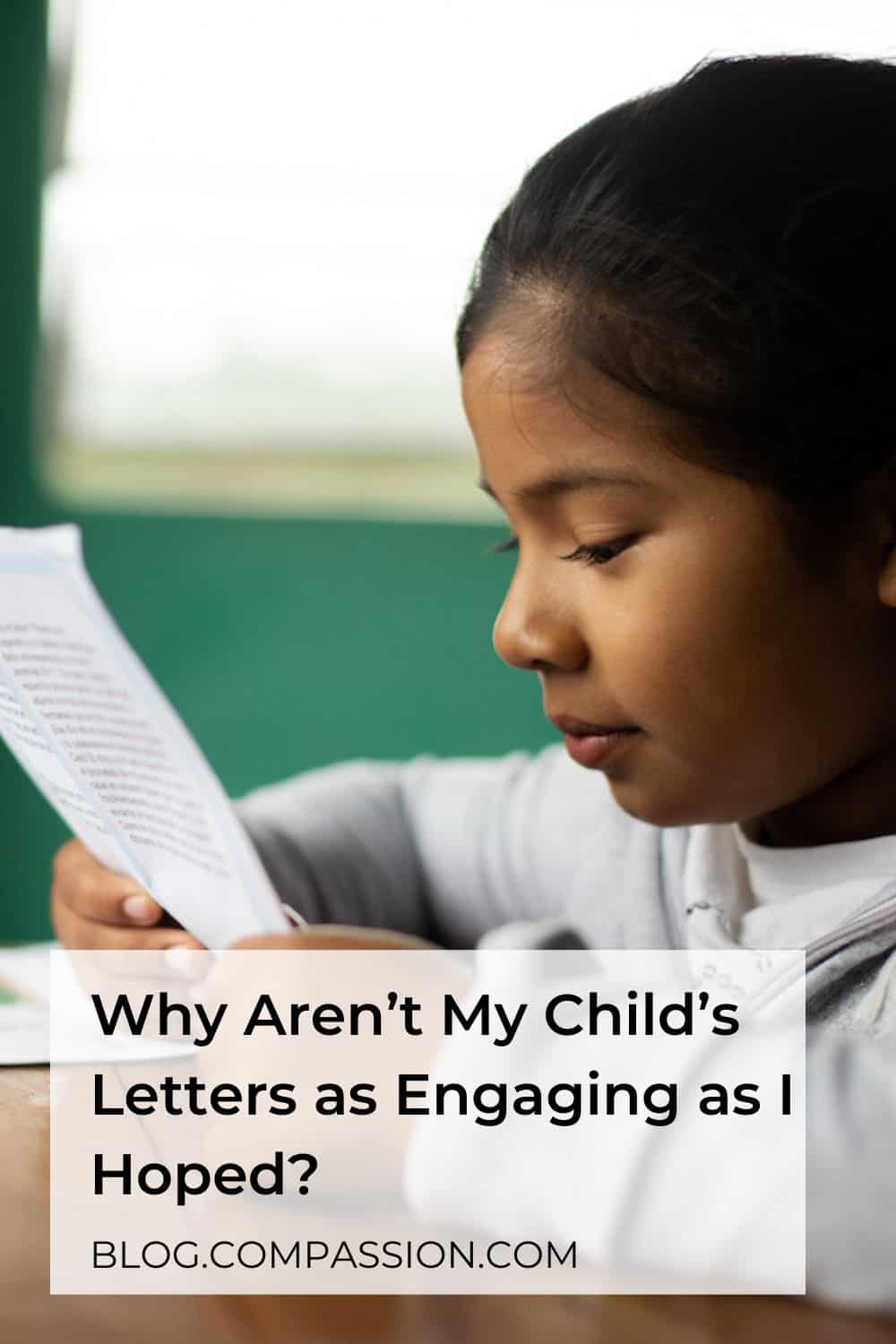Receiving an Interactive Sponsor Child Letter
Starting on the journey of sponsoring a child how to sponsor a child opens a unique avenue of connection and understanding between different worlds. One of the most heartwarming and interactive aspects of this journey is the exchange of letters. By writing lettersThrough Compassion International’s letter template, sponsors and children can share their lives, dreams, and experiences in a profoundly personal way. These sponsor child letters are bridges between hearts and cultures, fostering a meaningful bond. Whether it’s celebrating milestones, offering encouragement, or simply sharing the day-to-day joys and challenges, each letter is a window into each other’s world, enriching both the sponsor’s and the child’s life.
If you’re unsure what to write about in your letter, start with the Compassion International’s letter template.
Understanding the Dynamics of Child Sponsorship Letters
Discovering the differences behind each sponsor child letter can be as varied and enlightening as the personalities of children themselves. These are my boys, Asher and Avery. Asher is 8 years old and will be in third grade. Avery is 6 and will be in first grade.

They’re good boys but as you might be able to tell, they’re sort of goofballs. And while they’re so much the same, they’re also very different. Asher is more careful and plans his approach, whereas Avery is more of a “dive right in” kind of kid.
Just like everyone we know with kids at home, we had to homeschool them for the last part of the school year due to the coronavirus pandemic. And I’ve learned something from the experience that can provide some insight into a question I have heard from sponsors, especially sponsors of multiple children:
Why are some letters from my sponsored children personal and relational while others feel formulaic and impersonal?
Here are some example letters from some fellow sponsors so you can see what I mean.

Notice how the letter on the left feels prompted, how it follows a structure of greeting, update, question, update, blessing. While in the sponsor child letter on the right, it’s pretty clear that a real, relatable conversation is being had (even if you can’t understand the words).
I think the letter on the right is what most sponsors hope for when they make the decision to sponsor a child. But there are many reasons why your child’s letters may not be like this, especially right away.
Between my wife and I having to be our kid’s teachers over the last part of the school year, I noticed there are some key factors that affect a child’s ability to communicate. Here are a few:
1. Age
A child’s age is a big contributing factor. It’s also something we can easily take for granted. I became hyper aware of this while trying to lead my kids through their homeschool lessons. For example, Asher, my 8-year-old, could cruise through his homework without much help. I thought it’d be just as easy with Avery, but he needed more guidance. I guess I forgot that he’s just 6 and is still learning the basics.
And it’s the same with sponsored kids. Most people, when they begin to sponsor, choose to sponsor a younger child, between the ages of 4 to 9. There’s much that they are just learning. Writing a letter — a sponsor child letter that carries forward thought, context and emotion — is a skill that takes practice and experience.
Oh, and good examples. Even from a very young age, sponsored children love receiving letters from their sponsors. It’s something we hear from our church partners and in-country Compassion staff all the time: Sponsor letters are so important and cherished by a child. Many children keep every letter and store them in special places. So, stay the course and keep sending good examples of your own letters that your sponsored child can learn from.
2. Relationships
Relationships take time to develop and grow. Unless you go to visit your sponsored child, your child will likely never meet you in person, and so much nonverbal communication and warmth is lost in letters.
Give your relationship time to deepen and encourage it along by sharing how proud you are of your sponsored child. Share how you pray for them, how God has a purpose and a plan for their life, and how you are honored to be a stable source of encouragement in their life. A feeling of security and trust can go a long way toward helping your sponsored child to feel comfortable in opening up over time.
3. Personality
Wow! Can these be different! As I said at the beginning, my boys have so much in common. They are just shy of two years apart in age. They play together well and enjoy a lot of the same things. But in so many ways, as I experienced in trying to be their teacher for the last part of the school year, they are the exact opposite.
When Asher worked on his school writing assignments, his sentences tended to be direct and to the point without much embellishment or added flare. While Avery needed more help in the initial stages, his personality really comes out.
Your sponsored child has a core personality that has been gifted to them by God. Of course, it will be shaped, stretched and molded by the people around them, but who they are is who God made them to be. So it’s possible that your child’s personality is simply such that letters will tend to be more direct, businesslike and short. It doesn’t mean that your child doesn’t appreciate or care about you. (And if you ever visited them to have a face-to-face conversation with them, you’d likely see that.) But it does mean you might need to shift your expectations a bit for how their deep affection and appreciation for you is communicated.
Remember that this is a ministry – YOUR ministry – to a child who lives a vastly different kind of life than the kind you or I may have lived up to this point. This ministry to a child in poverty isn’t about what you or me get out of child sponsorship. It’s all about reaching into a seemingly hopeless situation – life in extreme poverty – and showing a child a kind of compassion that instills a belief that even in desperation good things can happen.
Perhaps you might even want to write an encouraging letter to reinforce that message now …

Never forget what a blessing you are to your sponsored child. And if you could only see how cherished your letters are, even if the sentiment isn’t greatly expressed in letters, you’d be blown away by the impact you’re having. Your presence in your sponsored child’s life is powerful! Even if you may never fully know it on this side of heaven.
How to Sponsor a Child through Writing Letters
Want a Compassion International Letter Template? Here are a few to choose from!
Pick a Child Sponsor Letter Template
What’s been your experience with sponsor child letters so far? For my friends who have been sponsors for a while, how do you think age, relationships and personality impacts the letters you’ve received over time? I’d love to hear your stories in the comments below.








36 Comments |Add a comment
Letter Writing
I find myself reading & repeating some of the same questions & answers to my kiddo. In one of my first letters I asked him favorite food, color(s) activities. We did it again??? I even called at one point so confused wondering if he got my 1st 2 letters. Our are letter hard to translate??? I try to keep them simple? Advice would be helpful!!! I want to communicate & actually get to know more about my child, family & lifestyle! Thanks
Thank you so much for blessing your precious child with letters! We are encouraged to hear your heart to build a relationship with your child. Many of the children who are in our programs are not familiar with the process of writing a letter and most often do not view it as an ongoing conversation. Over time, through receiving and responding to more letters, we find that the children begin to open up more about their lives. One thing we recommend to sponsors is numbering and highlighting their questions. This brings the focus of both our staff and your child to the specific questions you ask. We also have a wonderful selection of letter writing articles on our blog here: https://blog.compassion.com/category/about-letter-writing/. We are more than happy to speak with you further if you would like to send us an email at [email protected].
I love writing to my sponsored children. (Currently I sponsor 19 and have one correspondent kiddo.) The average age of my child is 8 years old though I have one as old as 20 and one as young as 1 (will be 2 on Christmas day!) I usually write several letters a month. The younger kids who have someone write for them, or check mark boxes, I still write to them just as frequently as I write the older children. I am blessed with my 20 year old who writes me long letters and his memory for what I have written to him is amazing. My 15 year old always includes a drawing of a car which I praise him for his artistic ability. Even the children who follow a “formula” or have someone write for them, it is just such a blessing to receive anything at all from the children. With every letter I send I try to include a Bible verse (at least one) and also tell them how much I love them and that I am sending them hugs. Above all I want them to know that they are loved, and that I pray for them everyday. (I use Compassion App with the prayer a day for the kids to make sure I don’t miss a day!) Sometimes it is disappointing when I send a family gift and don’t receive a picture (I know it has to be $60 or more) but I understand with Covid sometimes these things just can’t happen. I’m blessed with all my kiddos far beyond words. One sweet kiddo from Burkina Faso calls me Mom which just makes me melt each time as God has not blessed me with biological children or step children, or any other kiddos except my nieces and nephews and these cherished kids. I love them all so much and I hope God richly blesses every Compassion child and Compassion worker and Compassion volunteer. Thanks for this article. It is a good reminder!
Hi Jenny. Thank you so much for sharing your experience with writing to your sponsored children. It is a blessing to hear, and I know that your sponsored and correspondent children are thankful for each of your thoughtful, loving letters. Your passion to show each of these children love is very evident, and we are very grateful to have you in the Compassion family. 💙
I am finding the same things other contributors have mentioned above: questions not being answered, letters that are formulaic, but to add to this, our sponsored child’s handwriting has drastically changed. This isnt a difference of just neat versus messy, it’s completely different. Our sponsor child is 12 and should be writing her own letters. We started sponsoring her when she was 9…again, of writing age. I find this program so worth while and would be really disappointed to find out that we have been deceived for three years. I sincerely hope this is not the case.
Cris, I am so sorry your letter-writing experience has not been what you hoped for. I completely understand your concerns with the handwriting and your desire to hear from your precious sponsor girl personally.
Please know that your letters are reaching your sponsored girl and they are absolutely having an impact. In regards to the handwriting concern you mentioned, many children will have help from a tutor at their Compassion center writing letters. If the tutor writes the letter for them, they will have to sign somewhere to indicate that the child did not write the letter themselves.
We would love a chance to look into these letters for you further and see if we can address your concerns about the handwriting change. If this is something we can help you with, can you please email us at [email protected] with your sponsor information? Thank you so much, and we look forward to assisting you!
I just started this sponsorship 2 weeks ago. I’m already not convinced this program is real. I was charged additional funds that I did not approve. The so-called child I sponsor did not respond to any question or picture I sent. Just filled out some questionnaire. What’s the point of sending letter if they are not responding to them? Also, how much longer are you going to use covid as an excuse to not offer trips? Atleast allow live video chat with sponsor child, with all the technology there’s no reason why this is not possible. As much income your administration and staff has earned, I’m sure your able to use some funds and provide such resources.
Lawanda, I am sorry that you have not had a great experience, and we appreciate you sharing your concerns. Upon sponsoring a child, every new sponsor receives a pre-written letter from their child. This is meant to be an introduction to learning more about your sponsored child. These letters are written before the child is sponsored, so that is likely why your questions were not answered. Please know that we would love a chance to address your questions further and see if we can improve your sponsorship experience. Can you please send us an email at [email protected] so we can further answer your questions and locate your specific account?
I am sponsoring a child in Tanzania and when I started in 2011 my sponsored child wrote constantly and was very engaging. Only in the past year has my child letters become less personal. She used to draw pretty pictures to me and respond to the questions in my letters and let me know when her birthday gifts were received. Now for the past year the letters are impersonal, no drawings like she used to and it makes me wonder if she is even getting the letters. It seems as if someone is now writing the letters for her. I’m wondering why the change. Could it be a different staff on board?
Tiffany, first, thank you for your loyal support of your child for many years! I know your letters to her have been a precious gift. I am very sorry to hear that you have received fewer drawings and answers to your questions. Please know that the effects of Covid-19 may have impacted your letters. In many countries, child development centers are still closed or operating at a limited capacity. Due to these changes, children may have less help writing their letters as there are not as many tutors available. We know how hard this has been on many sponsors and children. I would be happy to check on your account to make sure your sponsor girl is receiving your letters and to see if there have been any other changes to her child development center. Can you please email our team at [email protected] with your sponsor ID? We look forward to assisting you and hope that this information helps!
Hi There, I have been sponsoring a child for 4 months and have not received any correspondence.
How long does it take before you hear something?
Thanks,
M
Hi Marilyn. Thank you so much for choosing to bless a child through your support. I am sorry that you have not received a letter from your kiddo. Normally, letters take about three months to reach each sponsor. Sadly, due to COVID-19, there have been significant delays in the letter process. With that said, I am happy to look further into this for you. Will you please send us an email at [email protected] so that we can we further assist you? Thank you!
I sponsor a 7 year old boy from Equador. When I write to him I always ask questions. His “letters” to me consist of a pre-printed page with 6 to 8 questions or statements (fill-in-the-blank) on it for him to answer and they have absolutely nothing to do with what I wrote to him or the questions I asked. I admit it’s very disappointing but I continue with my letters and my questions in hopes that one day he’ll answer them.
Diane, I am deeply sorry for any disappointment you may have with your correspondence experience thus far. We are so grateful that you responded to God tugging at your heart to sponsor sweet Jordan. I hear your heart for this ministry and your desire to foster a relationship with your little boy. Please know that our desire is for every sponsor to have this opportunity to develop a meaningful relationship with their child.
Children under the age of 9 typically use our form letters because it is easier for them to understand the concept of writing and to fill in the blanks. Sadly, many children feel timid or have a lack of confidence when it comes to writing. Because of that, they will often simply follow the letter prompts and suggestions of their tutor, resulting in a more generic letter. It is also quite common for children to be behind in their schooling due to a lack of opportunity or funds to pay for school fees.
Please rest assured that Jordan receives all your letter and should be answering your questions with the help of a tutor or parent. It looks like his mom is the primary person helping him with his letters. I am so sorry to hear that you aren’t really receiving answers to all of your questions. When a child receives a letter, often time they will take that letter home and put it away in a safe place. Then, when letter-writing day comes along, they may forget what their sponsor said or the questions their sponsor asked. I encourage you to do a few of these things to help your questions stand out: list them out, highlight them, and keep asking the same question until you get an answer. Sometimes repetition will help your kiddo remember your questions. I understand it can become discouraging to not receive answers from your child, but I encourage you to keep sewing love, encouragement, and support into his life. You are indeed making a difference in his life, even if you may not always see the fruits of your service.
As Jordan gets older, you will begin to see him write his own letters without the assistance of a tutor or his mom. Hopefully, with time and patience, he will begin to open up more to you and make his letters more personal. We sincerely appreciate all the love and care you give to your kiddo. If you have any additional questions, you are welcome to email us at [email protected]. God bless you!
I really appreciated this article. I’m going to keep all this in mind as I write and read future letters.
I’ve been a correspondent sponsor for a while, so I’ve exchanged letters with children of different ages. It was interesting to see (as you said) how a combination of age and personality makes letters different.
The older children have had much more to say. Even so, one seemed more outgoing and one more reserved. (Having grown up shy, I can relate. I always had a full-blown dialogue going on in my head, but people around me often thought I couldn’t speak!)
I’ve noticed the younger correspondent kids I’ve received letters from don’t say as much as the teens, which makes sense, as you’ve explained. My own great niece, who is incredibly expressive in person, writes very short notes, and now I will keep that distinction in mind as well (just as you’ve noted how different a letter is from an in-person visit). I’ll think about what it would be like if I only knew my great niece by her notes rather than her bubbly personality. I’ll remember the same about the kids I get letters from.
But what I have noticed with the younger kids is they remember what they read. I have been astounded at how they will make one comment or ask one question that came from a previous letter. They may only say that one thing. But it’s a real conversation. And it amazes me what stands out to them.
When I told one young child I live on another family’s farm, she asked me how many people work on the farm. I realized that she was relating that to her community. Whereas I simply live on a single family’s small farm. It was an interesting insight into her world and mine. And it showed me how perceptive she was. That was just one example.
My prayer is that if these kids remember some random fact about me, they will remember the many more things I tell them about God and about how amazing they are. That is so encouraging to me that they’re really hearing those words of encouragement, even when their words in response are few.
Thanks again for this great article that I will refer to again as I write and read future letters. It’s been so helpful to reflect on this.
Reading about your experience with correspondence warms my heart, Janet! Thank you for all the value and truth you send to these sweet kiddos through your letters! It is such a blessing knowing that even at such a young age, your children remember your conversations. May God continue to bless you Janet! ?
Hi. Thank you so much for sharing your thoughts on letters. It took one of my sponsored children several letters from me before he began opening up and truly expressing himself to me. His first letters were the same exact words each time! Now when he writes he tells me all about what he is doing and how much he loves getting his letters from me! My sponsored girl started sharing her personal life right away. Their age does make a big difference and also the family environment they live in, plus what you share with them means a lot!
Hello Cheryl! That is awesome to hear. Letter writing is such a great way to build that special relationship between you and your children. Thank you for caring about your children!
This is a very well timed article, thank you for it. I’ve been sponsoring my child for over half his life now and his letters fall into the “formula” category with the same pictures – a car always among them – and the mention of “football”. It’s good for me to see that it’s common, and to be exhorted to not take it personally. The past year has been tough for me and I found myself not writing as often because I allowed myself to be discouraged by the lack of response. I see now that my focus was getting skewed from serving him, and at the worst time too. Now, more than ever, my sweet little friend needs to know that God knows his name and loves him always. Thanks for encouraging us to keep encouraging others.
Hello Mandie! I am so glad that this blog post helped you. Letters are so special because as your child grows, they will be able to re-read these sweet letters you’ve sent. We appreciate all that you are doing for your child. You are a blessing. <3
I sponsor 6 kids through Compassion. Some of the letters I receive are “formulaic,” and some are not. It’s important to remember that we are in the child’s life to bless them, meet their needs, and help provide for them, not the other way around. I encourage everyone to just KEEP WRITING, even if the results are not what you hoped for! there may be cultural issues, educational issues, all kinds of reasons that the kids are not writing in the way you may hope. Maybe your sponsored child is a little spitfire who struggles to sit still through the tedium of writing a letter and would rather be off playing.
I have been on two sponsor trips (El Salvador and Ghana) and it is SO IMPORTANT to write the kids you sponsor! They treasure the letters. In Ghana I heard from an older teen, a graduate of the Compassion program, who had been sponsored by several people through his time in the program. There was one sponsor who never wrote and the teen considered dropping out because he felt like he didn’t matter. Thankfully, he did not and eventually had a sponsor who did write to him.
In Ghana my child has never written to me, letters are written by a staff member on her behalf. When I visited her, I discovered she has a vision problem and struggles in school.
In El Salvador, a group of us visited the home of a sponsored Compassion child. When we arrived, the first thing she did was run inside the house to bring out a letter from her sponsor who lives in Scotland. I took a picture of her and the pride and happiness on her face as we passed the letter around was priceless.
So please just write! You may be one of only a few people who the child ever receives kind words and encouragement from.
PB,
Wow! Thank you so much for taking the time to share your heart for letters with us! It truly means so much that not only do you sponsor, but you also choose to advocate for these sweet children! We are honored to have your voice standing up for these children and are so thankful to know that you are here to help us share the value they bring these kiddos! You are so right. Letters of love and encouragement truly go way further than any of us can imagine! ?
One of my kids (who just turned 20!) writes me pretty much the exact same thing every single time… But it’s OK – I trust God that my sponsorship is blessing him and his family. I didn’t see it mentioned in the article (although it may be in one of the many comments) that in some cultures letter-writing is just not a typical thing that’s done. (And what with email and texting, we in the US are writing fewer letters as well!)
I was fortunate enough to meet my sponsored son during the Rwanda trip this past summer. His letters have always been updates about the weather, crops, and school. After meeting him, I think he is just generally more reserved and also a 16 year old boy. I view his updates about crops as important information about how he and his family are doing as farmers. I have told him that I pray for a balance of sun and rain and healthy crops, because that’s how they earn a living. With that said, after my trip, he has been more open with his love for me and gratitude for my letters and gifts. The more I have expressed in my letters to him, the more he has been able to express. In contrast, I also sponsor a 19 year old girl in Rwanda and her first letters have been full of expressions of how much she and her family love me. One tip/thing that I have found helpful is to provide answers for any questions I ask my kids, e.g. I recently asked them where they would like to travel and then told them where I would like to go. It’s a way for us to learn more about them, while they also learn about us. For the young kids who fill out templates, I provide answers to the questions they’ve been asked, e.g. fave colour, what my house is made of, fave food, what holidays are like in North America. It helps them feel connected, e.g. they also know that I like the colour blue or eating pizza or going to the beach.
I am a new sponsor. On Mother’s Day I asked God for a child to sponsor and received a six year old little girl named Helen. She lives in Ecuador. Being new to sponsorship, I know that I will not receive a response anytime soon to the two letters that I have written. With the pandemic the offices are closed. Hopefully as people become healthy again the offices will open. In reading everyone’s comments I am gaining insight as to how to communicate with her and what I might expect in a return letter. . They are helpful, thank you.
I have three children currently, ages 5 (started when she was 3), 6 and 10. While I tend to get great letters from my youngest’s mother, I’ve definitely noticed some formulaic response when they’re translating “for the kids.” I think sometimes center teachers and parents who assist want to say what they think we want to hear or perhaps even what is recommended or suggested to them to say. Always very grateful (way more than they need to be ;)) and usually the “child” asks me to pray that they will be obedient to their parents and love God. Some of this I think is cultural, either the Compassion center culture or the country/region culture. Some of the kids honestly are just really young… I make my own children (twins – seven) write thank you notes and you can very much see the same issues. “Thank you for X. I also got A, B, C. The end.” Thinking back, I did the same thing as a kid, even into my tweens. It wasn’t that I didn’t appreciate hearing from adults; it was just that the actual process of writing was kind of a pain and I never really knew what to say. As a parent, I’ve found that sitting and talking my child through what they might have to say helps a lot, but that’s very likely not happening in most cases, nor is it necessarily a reasonable expectation for us to have of them. I didn’t really take to writing until my teen years when I became more aware of my own thought processes and feelings. Writing is very much not natural for a lot of our kiddos and not necessarily reinforced the way it is in more developed nations, who are regularly required to communicate through writing.
I also recall distinctly having my Girls in Action class (6th grade) each choose a missionary and write letters of encouragement to them. A couple of them got tons of things in return and had a really engaging relationship. Some of the others, not so much. A couple never heard anything, and they were discouraged and frustrated. We had to talk a lot about what ministry means and how we do these things because it pleases the heart of God and encourages our family in Christ. Not because of what we get in return. They were able to address that issue from a good perspective by the end of the year.
As a side note, I received a letter from one of the Compassion partner pastors in Haiti who mentioned that the children get frustrated and angry when they are required to write letters to sponsors who never respond. Which is fair… they have to write, we technically don’t. But it’s worth noting that even when they aren’t great letter writers, they’re sending those words out into the great unknown, watching others around them receive answers and hoping, hoping that the next envelope, the next answer, will be for them. From us.
This is a reply to Bev June 8, 2020. Perhaps the Teen you mentioned who still has letters written for her has a
“learning disability” which is not yet overcome. I had that problem only in the area of writing though I enjoyed reading a great deal. It took me the first two decades of my life to learn to write well.
I have 8 children currently, and have had a few more in the past. I absolutely love writing and receiving letters! I think the quality also has a lot to do with the person helping them write the letters, and sometimes the translation. I have some younger children whose family members or center workers help them write amazingly detailed letters, and others who only write the basics. I have gotten really good at translating a couple of the languages, and many times I can tell that something has been translated wrong. I will type it into a translation website to verify, and see what they really meant. Regardless of the quality, it is all about the children, and making them feel loved and special is what matters most!
Hi Laurie! Thank you so much for ministering to your children with your letters! I am so glad to hear they have been a blessing to you! I am really sorry that there have been several translation errors, but I appreciate your willingness to investigate the translation and find the true meanings from context. If you ever receive a letter you cannot understand or find what they really meant, please let us know by sending us an email at [email protected].? We are happy to look into the letters and see if we can fix the translation problem.
I sponsor a 6 yr old in Bolivia for 2 years and a 16 yr old boy from Kenya for 9 years. I learned pretty quickly that if I asked some very specific questions, they are always answered. I absolutely love every letter I get because to me that letter means they know I love them and they know God loves them regardless of what they would say in a letter.
I agree with your perspective about letters that our sponsored children write. However, I think there is at least one other concept to conside—that of the child’s culture. Some cultures even within the same country are more reserved than others, or more gregarious. Some cultures are more formal than others. The child may be trying to meet his cultural norms as he/she learns to write letters.
For the most part, the children I have written to for a longer period of time [several years in some cases] write better letters, and mostly the older children do better, but not always. I try to ask questions and mark them with asterisks to draw attention to them, and I have found this to be pretty successful in getting answers to them. Even with all of this, I know that the letters I get from most of my kids aren’t like some of you get from your kiddos. You are right, though, that this is a ministry and it’s about the kids and not about me.
I have sponsored 3 children to date and 2 of those are still under my sponsorship. Miguel was 4 when I sponsored him 7 years ago; Nia was 12 when I sponsored her 10 years ago (she has since graduated and left the program); and Elias was 14 when I sponsored him 4 years ago (he says he has graduated but I have not been notified by Compassion that he is or is not still in the program – guessing he still is as I am still having $$ taken from my bank account for him).
Elias and Nia were engaging letter writers from the beginning since they were much older (14 and 12). Miguel was pre-school aged so his initial letters were just checked boxes with a drawing sometimes.
Letter writing can also be a huge challenge for sponsors. I initially found it really difficult to write to children in poverty without hinting of my prosperity (even though I am considered lower middle class!). I had to write, rewrite and rewrite again to take out things or add things that would be of interest but not making it seem that I was “bragging” about my wealth compared to theirs. I still sometimes find this a challenge.
Is it just me or would others have found it fun to see the contrast in translation for the letter on the right? Disappointing. However, of course a lovely and thoughtful post nevertheless.
I was fortunate to be mentored in the Facebook group early on that it is for we the sponsors to uplift our kids through letter writing. Even what might feel like excessive writing probably really isn’t, that’s how much the children need encouragement. The encouragement needed is immeasurably large. This mentoring was a godsend because I otherwise would have “held back” with uncertainty about overstepping or cultural misunderstanding, etc…my mentor helped me understand a kid is a kid anywhere in the world and needs heaps of loving attention.
So I have learned to use my imagination and just take off with each letter, being sure to ask numbered questions and balance info about myself and life with inquiries to the children and mention off pride and love for them. My mentor also assured me that sending worksheets, puzzles, games on paper as far as electronic attachments to the letter are welcomed ecstatically.
I’m still new to this and haven’t received a letter yet complicated by the pandemic, but when I finally get one, even if it feels – let’s say – not very “deep,” I will treasure it so exquisitely and look forward to the waves of letters to follow from kids who, I trust in God, devour my letters.
Never forget how important your letters are, because they really are!
I noticed this myself when I went to Tanzania with Compassion Netherlands. There I would meet two of my correspondence children. I wrote with both of them for 5 years. One was 20 and always wrote very long letters to me. The other was then 12. I always received the same kind of letters from her, with little new information. I was quite excited to meet them and didn’t know how the 12 year old would react, maybe very shy.
But when the time came, the 12 year old jumped around my neck and kept repeating that I was her friend. She had taken all the letters I had written to her (or at least recently) to show how important they were to her!
Her letters are still a bit the same, but I now know how important my letters are to her. And that’s what I do it for!
I could relate well to this article. The child I have sponsored the longest (>10 years) was too young to write at first and his mother wrote letters in English and we had wonderful exchanges about him. But then he got old enough to write and in 10 years I get pretty much the same formula letter and exactly the same drawing he did 10 years ago — a house ,a tree, and a mountain. He never answers questions.
Another older child I sponsored (now graduated) was a wonderful artist and as soon as I started commenting on the drawings he sent, he stopped send them to me. He wrote the obligatory letter a year and never shared a single thing. He didn’t even mention when he graduated, nor mentioned birthday gifts I sent each year.
I have a handful of kids (of the 17 I sponsor or write to) who actually write letters, but most of them are formulas and yes, it is disappointing. One is in her teens and still has someone from Compassion write for her, though I don’t know why.